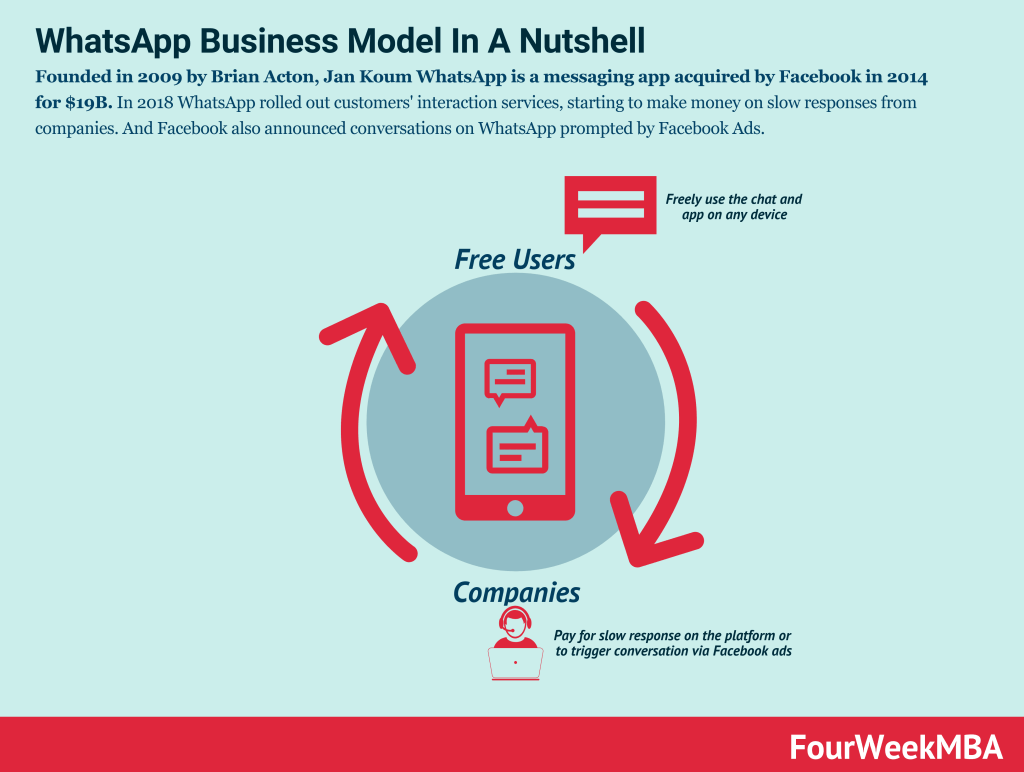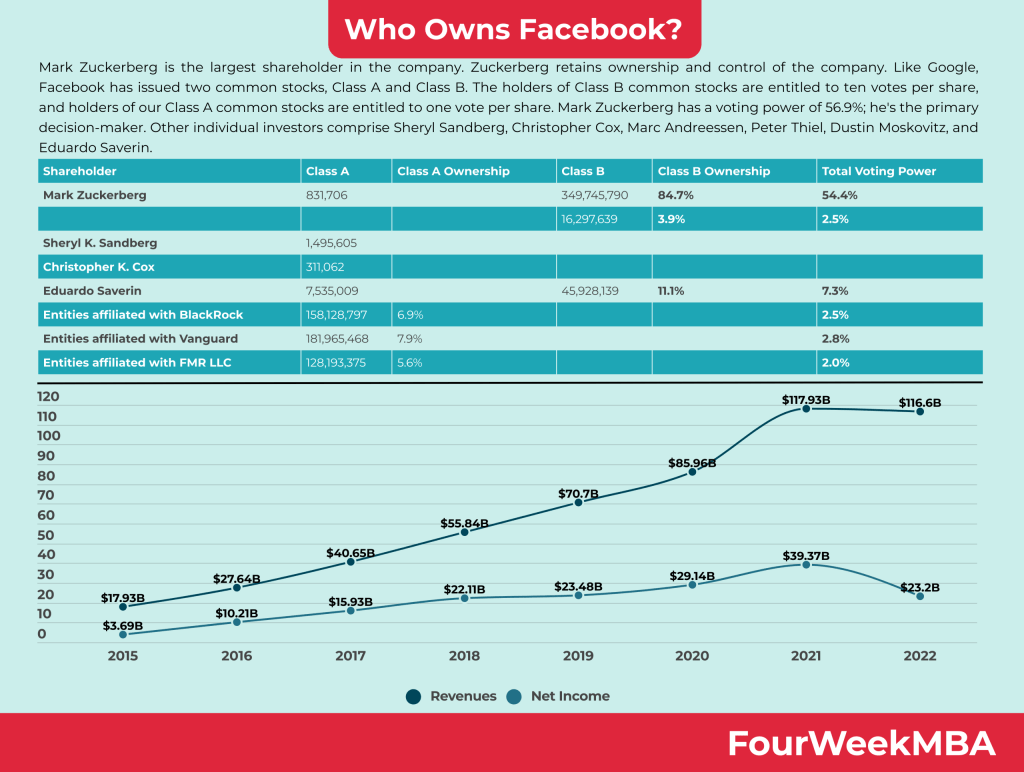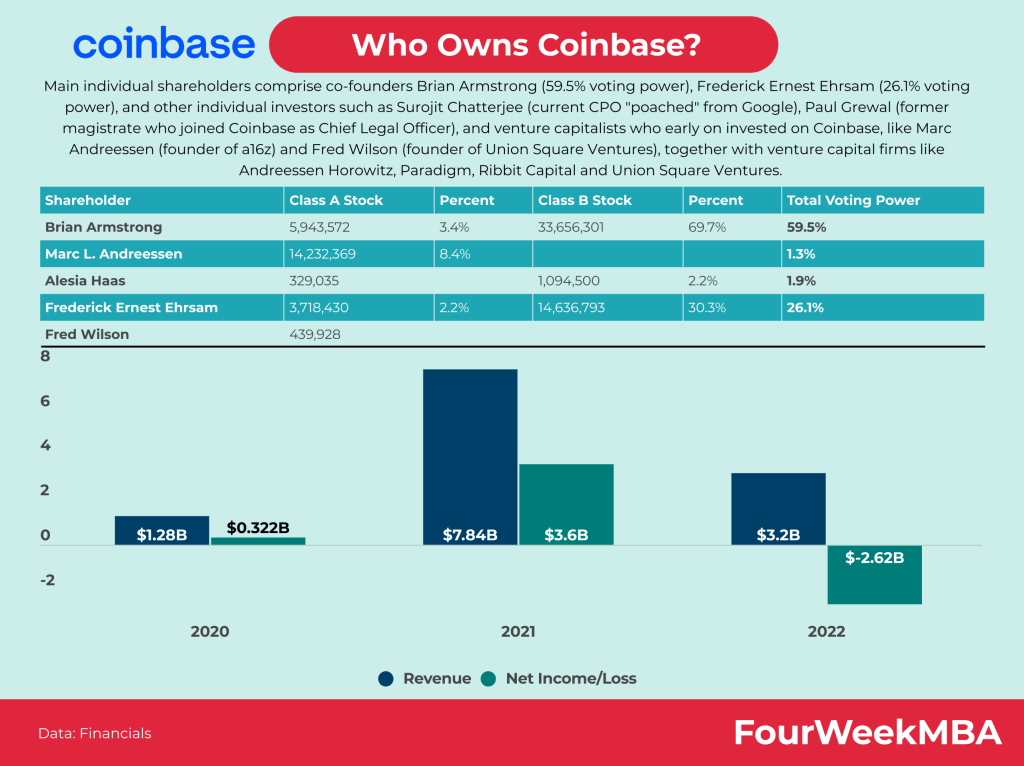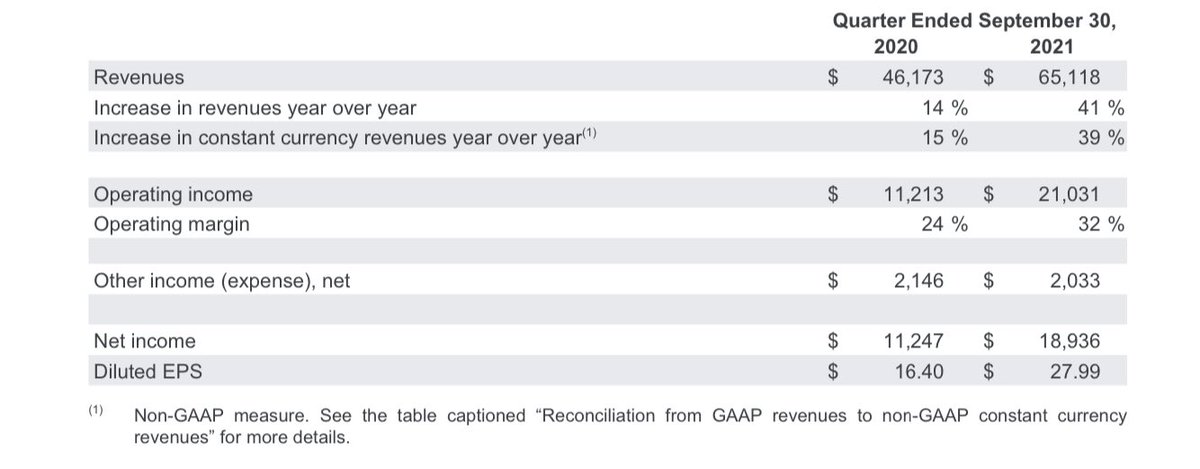Mark Zuckerberg is the largest shareholder in the company. Zuckerberg retains ownership and control of the company. Like Google, Facebook has issued two common stocks, Class A and Class B. The holders of Class B common stocks are entitled to ten votes per share, and holders of our Class A common stocks are entitled to one vote per share. Mark Zuckerberg has a voting power of 61.1%; he’s the primary decision-maker. Other individual investors comprise Sheryl Sandberg, Christopher Cox, Marc Andreessen, Peter Thiel, Dustin Moskovitz, and Eduardo Saverin.
| Aspect | Description | Analysis | Examples |
|---|---|---|---|
| Products and Services | Meta offers a range of products and services in the social media, virtual reality (VR), and augmented reality (AR) domains. Its primary social media platform, Facebook, connects billions of users worldwide. Instagram, WhatsApp, and Messenger are also part of Meta’s social media ecosystem. Oculus VR devices and the Metaverse are prominent offerings in the VR and AR sectors. The company provides advertising and digital marketing solutions to businesses through its ad platform. | Meta’s core products include social media platforms like Facebook, Instagram, WhatsApp, and Messenger, catering to billions of users for communication and content sharing. Oculus VR devices and the Metaverse represent its ambitions in immersive technologies. Advertising and digital marketing solutions on its ad platform generate substantial revenue. Meta serves both individual users and businesses with its diverse product portfolio. | Social media platforms connecting billions of users (Facebook, Instagram, WhatsApp, Messenger), immersive technologies with Oculus VR devices and the Metaverse, advertising and digital marketing solutions through the ad platform, catering to individual users and businesses with a diverse product portfolio. |
| Revenue Streams | Meta generates revenue primarily from digital advertising. Businesses pay to advertise their products and services on Meta’s platforms, targeting users based on demographic and behavioral data. The company also earns income from its virtual reality hardware sales, subscriptions, and app store sales. | The main source of revenue for Meta is digital advertising, with businesses leveraging the platform’s extensive user base and targeting capabilities. Income also comes from the sale of Oculus VR hardware, subscription services, and app store sales within the VR ecosystem. Meta’s diversified revenue streams provide financial stability. | Revenue from digital advertising through its platforms, income from the sale of Oculus VR hardware, subscription services, and app store sales in the VR ecosystem, diversified revenue sources ensuring financial stability. |
| Customer Segments | Meta serves a broad customer base that includes individual users of its social media platforms and businesses seeking to advertise and engage with users. Individual users utilize Meta’s platforms for social networking and communication. Businesses use Meta’s advertising tools to reach their target audience and promote their products and services. | Customer segments for Meta encompass individual users who use its social media platforms for social networking and communication. Businesses are another key segment that leverages Meta’s advertising tools to reach and engage with their target audience. Meta caters to both individual users and businesses with its products and services. | Individual users using social media platforms for social networking and communication, businesses leveraging advertising tools to reach their target audience and promote products and services, catering to a diverse customer base. |
| Distribution Channels | Meta’s products and services are primarily distributed through digital channels. Users can access its social media platforms and VR content through mobile apps, websites, and VR headsets. Businesses utilize Meta’s advertising platform, which is accessible online. Meta also collaborates with hardware retailers to distribute Oculus VR devices through physical stores. | Distribution channels for Meta encompass digital platforms, including mobile apps, websites, and VR headsets, providing users with access to social media and VR content. Businesses access the advertising platform online to promote products and services. Collaborations with hardware retailers extend the distribution of Oculus VR devices through physical stores. Meta employs a multi-channel approach for accessibility. | Digital platforms for users to access social media and VR content (mobile apps, websites, VR headsets), online advertising platform for businesses, collaborations with hardware retailers for Oculus VR device distribution through physical stores, multi-channel approach ensuring accessibility. |
| Key Partnerships | Meta collaborates with various partners to enhance its offerings and expand its ecosystem. These partnerships may involve content creators and publishers for social media content, app developers for the VR ecosystem, and hardware manufacturers for Oculus VR devices. The company also collaborates with advertisers and businesses for digital marketing solutions. | Collaborations with content creators, publishers, and app developers enrich Meta’s content libraries in social media and the VR ecosystem. Partnerships with hardware manufacturers ensure the availability of Oculus VR devices. Cooperation with advertisers and businesses enhances digital marketing solutions. Meta’s partnerships contribute to the growth of its ecosystem. | Collaborations with content creators, publishers, and app developers for enriched content libraries, partnerships with hardware manufacturers ensuring Oculus VR device availability, cooperation with advertisers and businesses for enhanced digital marketing solutions, partnerships contributing to ecosystem growth. |
| Key Resources | Meta’s key resources include its extensive user base on social media platforms, technology infrastructure for content delivery and data analysis, a diverse workforce, and a recognized brand in social networking. The company’s VR hardware development and content creation capabilities are vital for its immersive technology initiatives. Data generated from user interactions and behaviors are valuable assets for targeted advertising. | Key resources for Meta encompass its vast user base on social media platforms, advanced technology infrastructure for content delivery and data analysis, a diverse and skilled workforce, and a renowned brand in social networking. Hardware development and content creation capabilities support immersive technology ventures. User data is a valuable asset for targeted advertising and personalization. Meta’s resources empower its digital and immersive offerings. | Vast user base on social media platforms, advanced technology infrastructure for content delivery and data analysis, diverse and skilled workforce, renowned brand in social networking, hardware development and content creation capabilities for immersive technology initiatives, valuable user data for targeted advertising and personalization, resources empowering digital and immersive offerings. |
| Cost Structure | Meta incurs costs related to the operation and maintenance of its technology infrastructure, including servers and data centers. Employee salaries and benefits contribute to workforce management. Research and development expenses support innovation and the development of new technologies. Marketing and advertising costs promote its platforms and VR devices. Additionally, Meta manages costs associated with content licensing and partnerships. | Costs associated with Meta’s operations include technology infrastructure maintenance (servers, data centers), employee salaries and benefits for workforce management, research and development expenditures for innovation, marketing and advertising expenses promoting platforms and VR devices, costs related to content licensing and partnerships. The company efficiently manages expenses while driving innovation and growth. | Costs related to technology infrastructure maintenance (servers, data centers), employee salaries and benefits for workforce management, research and development expenditures for innovation, marketing and advertising expenses promoting platforms and VR devices, costs associated with content licensing and partnerships, efficient cost management driving innovation and growth. |
| Competitive Advantage | Meta’s competitive advantage lies in its extensive user base across its social media platforms, which attracts advertisers seeking to reach a broad audience. Advanced technology infrastructure enables data analysis for targeted advertising and content personalization. Its strong brand recognition and reputation in social networking foster user trust and loyalty. The company’s immersive technology initiatives, including Oculus VR devices and the Metaverse, position it as a leader in the future of digital interaction. Collaborations with content creators and developers enrich its content offerings. | Meta’s competitive edge is rooted in its vast user base on social media platforms, a magnet for advertisers seeking broad audience reach. Advanced technology infrastructure supports data analysis for targeted advertising and content personalization. A trusted brand and social networking reputation foster user trust and loyalty. Immersive technology ventures, including Oculus VR devices and the Metaverse, position Meta at the forefront of digital interaction. Collaborations with content creators and developers enhance content offerings. | Extensive user base on social media platforms attracting advertisers for broad audience reach, advanced technology infrastructure enabling data analysis for targeted advertising and content personalization, trusted brand and social networking reputation fostering user trust and loyalty, leadership in immersive technology ventures (Oculus VR devices, Metaverse), collaborations with content creators and developers enriching content offerings, competitive advantages driving Meta’s growth and influence. |
Who is Christopher Cox?
An American lawyer and former U.S. Securities and Exchange Commission Chairman, a 17-year Republican United States House of Representatives member. Christopher Cox is an attorney, teacher, and entrepreneur.
Who is Sheryl Sandberg?
Sheryl Sandberg is an American businesswoman. She served as the chief operating officer of Facebook from 2008 until she stepped down in 2022.
In June 2012, she was also elected to the board of directors by the existing board members, becoming the first woman to serve on its board.
Before Facebook, Sandberg was Google’s Vice President of Global Online Sales and Operations.
Who is Eduardo Saverin?
Eduardo Saverin is a Brazilian internet entrepreneur and investor. Saverin is one of five co-founders of Facebook (with Mark Zuckerberg, Dustin Moskovitz, Chris Hughes, and Andrew McCollum).
Who is Peter Thiel?
Peter Thiel is a German-born American entrepreneur, venture capitalist, and hedge fund manager. Thiel co-founded PayPal with Max Levchin and served as its CEO.
Who is Marc Andreessen?
Marc Andreessen is an American entrepreneur, investor, software engineer, and multi-millionaire. He is best known as the co-author of Mosaic, the first widely used Web browser; as co-founder of Netscape Communications Corporation; and as co-founder and general partner of Silicon Valley venture capital firm Andreessen Horowitz.
How Does Facebook Business Model Work?
Facebook is based on the advertising business model.
Even though there are several sources of income, most of the revenue comes from ads:

How Does Facebook Make Money?

Facebook makes most of its money from advertising:
1. Advertising (over 97.4% of revenues): it consists of displaying ad products on Facebook, Instagram, Messenger, and third-party.
2. Reality Labs: now consisting of all the development of products for the Metaverse. Here it includes Oculus, now rebranded as Meta Quest.
Key Highlights
- Mark Zuckerberg: As the largest shareholder, Mark Zuckerberg holds a voting power of 56.9%, allowing him to retain ownership and control of the company.
- Class A and Class B Common Stocks: Facebook has two types of common stocks, with Class B shareholders entitled to ten votes per share and Class A shareholders entitled to one vote per share.
- Other Individual Investors: Notable individual investors in Facebook include Sheryl Sandberg, Christopher Cox, Marc Andreessen, Peter Thiel, Dustin Moskovitz, and Eduardo Saverin.
- Facebook’s Business Model: Facebook’s primary revenue source is advertising, contributing over 97.4% of its total revenues. The company displays ad products on its platforms like Facebook, Instagram, and Messenger.
- Reality Labs: Facebook also generates revenue from its Reality Labs division, which focuses on products for the Metaverse, including Oculus (now rebranded as Meta Quest) and other augmented and virtual reality products.
Read Also: Facebook Hidden Revenue Business Model Explained.
Related Visual Stories











Facebook Organizational Structure



Related Tech Ownership Case Studies


























Read More:


![How Does Facebook [Meta] Make Money? Facebook Business Model Analysis 2024 facebook-business-model](https://i0.wp.com/fourweekmba.com/wp-content/uploads/2024/02/facebook-business-model.png?resize=150%2C113&ssl=1)






